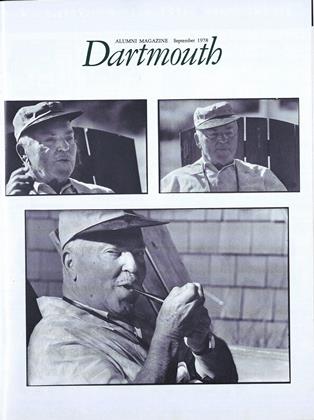Only two years old, and already Celebration Northeast has become such a fixture of July in Hanover that it's known as "CNE" for short. And that, hereabouts, is true establishment.
CNE is the brainchild of Kathleen Hammer, the person in charge of Hopkins Center's outreach program, conceived a couple of years ago when she went off to Louisiana for a conference on the folk arts. An evening of Cajun music put her in mind of the historic eastern Canadian antecedents of the Acadian exiles and of the traditional folk dance and music of New Englanders as well. As a colleague at the Center put it, "Kathy Hammer is the sort not only who has great ideas, but also who manages to find the money to finance them." So CNE was born, with the help of the National Endowment for the Arts.
Opinions vary as to whether this year's crowd - popularly estimated in the neighborhood of 5,000 - was bigger than last year's, despite the oppressive heat, or slightly diminished by the scorching day, but the mass of swirling, sweltering humanity at Saturday's festivities on the Green testified to the zeal and stamina of the folk-art buff. They were young and old, dowagers and street people, honest farmers and ersatz back-to-the-woods types. They thronged to the morning workshops in dancing and vocal and instrumental music and stayed to cheer the fiddlers, the yodelers, and the ensembles who performed through the afternoon. They lounged about on the grass or danced unself-consciously on the fringes of the crowd. They ate a lot of home-baked goodies and cooled themselves down with traditional fruit drinks and even more traditional beer.
Like last year, they were particularly taken with the Ed Larkin troupe of contra dancers - its eldest member rumored to be over 90 - who defied the 97-degree temperature and 72 per cent humidity by remaining properly turned out in frock coats and stovepipe hats, prim bonnets and long skirts over multiple petticoats.
Slightly more formal concerts packed Spaulding Auditorium three nights running. Thursday evening it was an Irish piper and a harpist, a Vermont fiddlercum-square dance caller, and a quartet who sang the ballads and told the tall tales of the sea. On Friday, a Polish dance orchestra from Hartford - featuring "the singing carpenter from Windsor Locks," had them literally dancing polkas in the aisles; the New Hampshire Miller brothers played reels and jugs and melancholy Scottish airs in piano and fiddle and antique melodeon; and a Massachusetts bluegrass group presented familiar tales of unrequited love and trains in the night on banjo, mandolin, rhythm guitar, and bass. At Saturday's finale, a Cajun band brought traditional music from Louisiana; two local women presented some old New England ballads and some of their own compositions; an Englishman from "the real Norwich" in Norfolk sang folk songs to his own concertina accompaniment and told mildly risque stories; and La Grande Visite, a troup of French Canadian clog dancers, drew a standing ovation at midnight from the capacity crowd that had long since overwhelmed the airconditioning system.
Yodeling Slim Clark was heard to say Saturday afternoon that "I'm so grateful things like this have come back so we can do the good old stuff."
 View Full Issue
View Full Issue
More From This Issue
-
 Feature
FeatureA Company of Stretchers
September 1978 By Cay Wieboldt -
 Feature
FeaturePoet at Full Ahead
September 1978 By Charles G. Bolte -
 Feature
FeatureTHE RIVER and THE DAMS
September 1978 -
 Article
ArticleA Journey: Five days to Big Rapids
September 1978 By Dan Nelson -
 Article
ArticleDickey-Lincoln: Who wants it? Who needs it?
September 1978 By Greg Hines -
 Article
Article'A Spirit of Fire and Air'
September 1978 By NARDI REEDER CAMPION
Article
-
 Article
ArticleWATERWAYS REPORT BY PROFESSOR DIXON
January, 1910 -
 Article
ArticleBoston Dinner
February 1939 -
 Article
ArticleThoughtful Ink
NOVEMBER | DECEMBER 2015 -
 Article
ArticleHow to Become "Club of the Year"
NOVEMBER 1971 By KEN LUNDSTROM '55 -
 Article
ArticleProfessor Einstein, Relativity, and Mt. Wilson
MARCH 1932 By Walter S. Adams -
 Article
ArticleThe Undergraduate Chair
MAY 1970 By WINTHROP A. ROCKWELL '70


